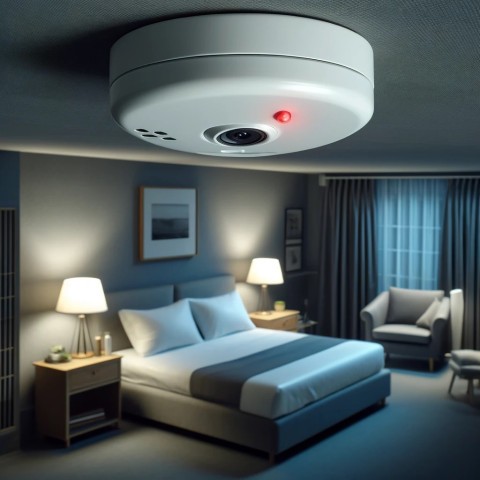In recent years, there has been a rising wave of complaints from escort workers about hidden cameras being installed in hotel rooms where they meet clients. These hidden cameras, often placed in inconspicuous locations like air conditioning vents, lamps, decorative items, and smoke detectors, pose a significant threat to the privacy and safety of sex workers. This article aims to provide a comprehensive guide for escorts on how to avoid being secretly recorded, the tools available to detect hidden cameras, and the legal steps they can take if they become victims of such invasive surveillance.
The Growing Threat of Hidden Cameras
The use of hidden cameras in hotel rooms is not a new phenomenon, but with the advancement of technology, these devices have become smaller and more difficult to detect. For escorts, who often rely on the discretion and privacy of hotel rooms for their work, the possibility of being recorded without consent is a serious concern. These recordings can not only violate their privacy but also lead to severe personal and professional repercussions if the footage is shared or sold online.
Steps to Avoid Being Secretly Recorded
1. Choose Reputable Hotels Staying at reputable hotels with stringent security measures can reduce the risk of hidden cameras. High-end hotels are more likely to have better security protocols and regular room checks. However, this is not foolproof, and additional precautions should always be taken.
2. Conduct a Thorough Room Inspection Upon entering a hotel room, it is crucial to conduct a thorough inspection. Look for anything unusual or out of place, particularly in areas where you would be most vulnerable, such as the bedroom and bathroom. Pay special attention to the following:
- Air Conditioning Vents and Smoke Detectors: These are common spots for hidden cameras. Check for any unusual lights or lenses.
- Lamps and Decorative Items: Inspect these items closely for any signs of tampering or small holes that could conceal a camera.
- Mirrors: Perform the "finger test" to check for two-way mirrors. Place your fingertip against the mirror; if there is a gap between your finger and its reflection, it is likely a regular mirror. If there is no gap, it could be a two-way mirror with a camera behind it.
3. Use Detection Devices There are several tools available that can help detect hidden cameras:
- RF Detectors: These devices can detect the radio frequencies emitted by wireless cameras. By scanning the room with an RF detector, you can identify any active surveillance equipment.
- Camera Lens Detectors: These detectors use infrared light to locate camera lenses, even those that are not actively recording. By shining the light around the room and looking through the detector, you can spot the reflective surface of a camera lens.
- Smartphone Apps: There are various apps available that can help detect hidden cameras by scanning for wireless signals or using the phone's flashlight to detect camera lenses.
4. Cover Potential Camera Spots If you find any suspicious objects that could potentially house a camera, cover them with a cloth, tape, or other materials. This can provide an immediate, though temporary, solution to protect your privacy.
5. Report Suspicious Findings If you discover any hidden cameras or suspect that your room is being monitored, report it to hotel management immediately. Insist on changing rooms and consider contacting local authorities to file a report.
Legal Steps and Resources
1. Understanding Your Legal Rights If you discover that you have been secretly recorded, it is important to understand your legal rights. Most jurisdictions have strict laws against unauthorized surveillance, especially in private spaces like hotel rooms. Recording someone without their consent is typically a criminal offense, and you have the right to seek legal recourse.
2. Collect Evidence Before leaving the room, take photographs and videos of the hidden camera and its placement. Document any interactions with hotel staff and keep a record of all correspondence related to the incident. This evidence will be crucial if you decide to pursue legal action.
3. Contact Law Enforcement Report the incident to local law enforcement. Provide them with all the evidence you have collected and file a formal complaint. Law enforcement can conduct a thorough investigation and help identify the individuals responsible for the surveillance.
4. Seek Legal Counsel Consult with a lawyer who specializes in privacy law and can guide you through the legal process. They can help you understand your rights, the potential outcomes of your case, and assist in taking legal action against the hotel or any other parties involved.
5. Removing Videos from the Internet If footage of you is posted online, there are steps you can take to have it removed:
- Contact the Website: Most websites have policies against non-consensual pornography and will remove such content upon request. Contact the website's support team and provide them with evidence of the non-consensual recording.
- DMCA Takedown Notices: File a Digital Millennium Copyright Act (DMCA) takedown notice if the content violates your copyright. This can compel websites to remove the content.
- Professional Services: Consider hiring a professional service that specializes in online content removal. These services can navigate the complex process of contacting websites, filing requests, and monitoring the internet for reposts.
6. Support and Advocacy There are organizations that provide support and advocacy for sex workers who have been victims of non-consensual recordings. These organizations can offer legal assistance, emotional support, and resources to help you navigate the aftermath of such an incident.
- Sex Workers Outreach Project (SWOP)
- St. James Infirmary
- Red Umbrella Project
These organizations can connect you with legal aid, provide counseling services, and advocate on your behalf to ensure your rights are protected.
The threat of hidden cameras in hotel rooms is a serious concern for escorts and sex workers. By taking proactive steps to inspect rooms, using detection devices, and understanding your legal rights, you can better protect yourself from unauthorized surveillance. If you do find yourself a victim of such an invasion of privacy, there are legal avenues available to seek justice and have non-consensual footage removed from the internet. Remember, your safety and privacy are paramount, and there are resources and support systems available to help you navigate these challenges.













